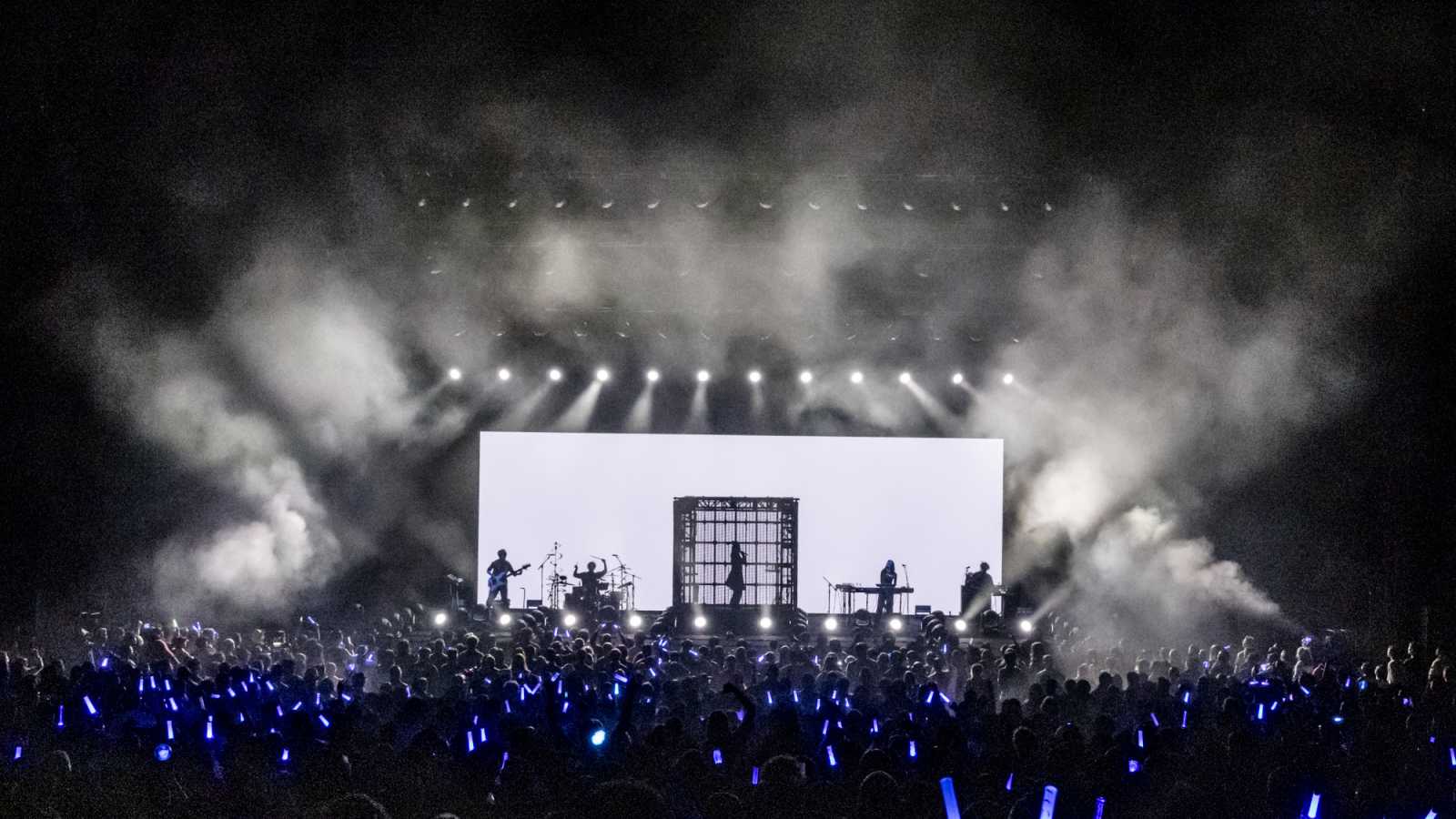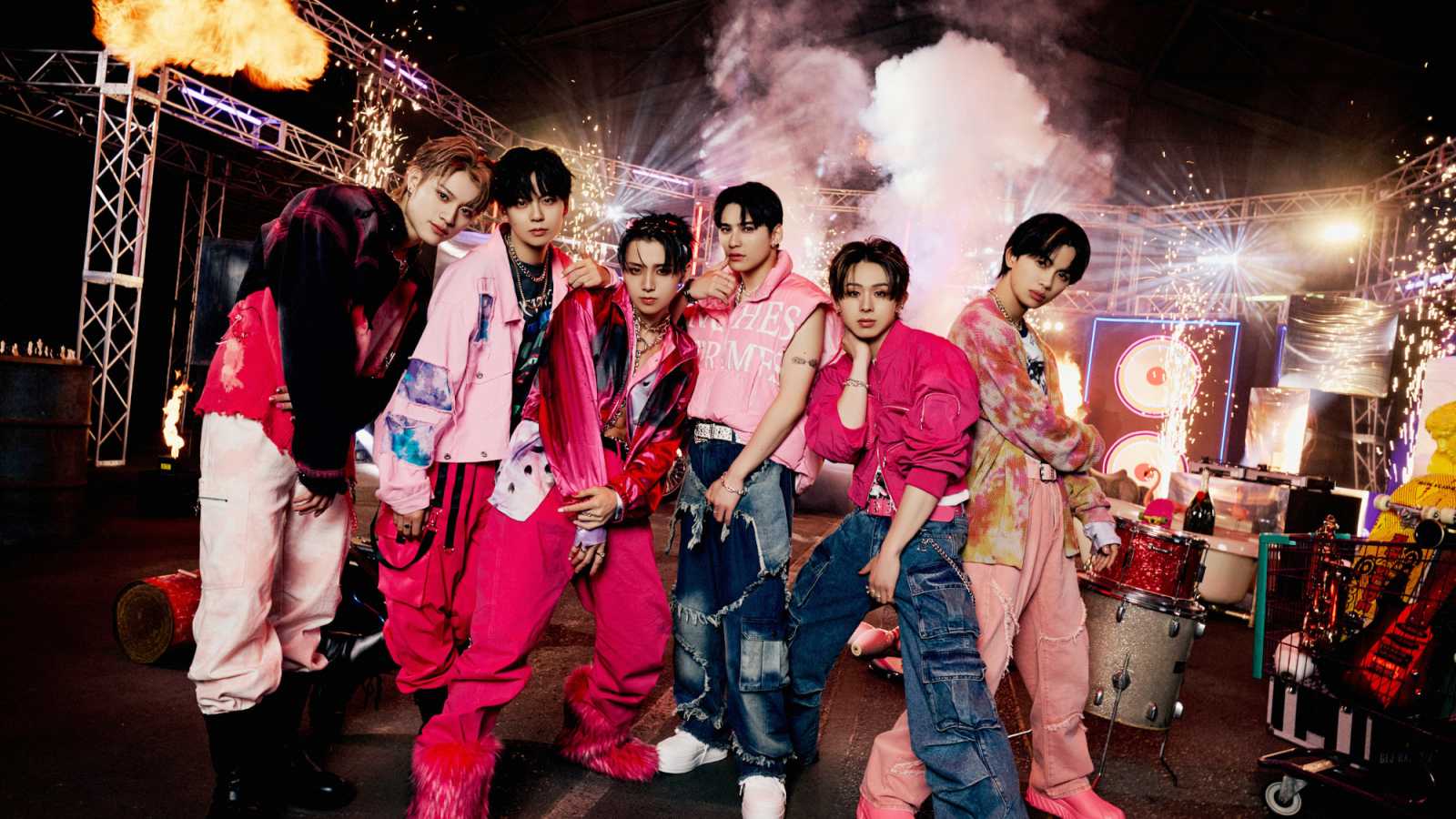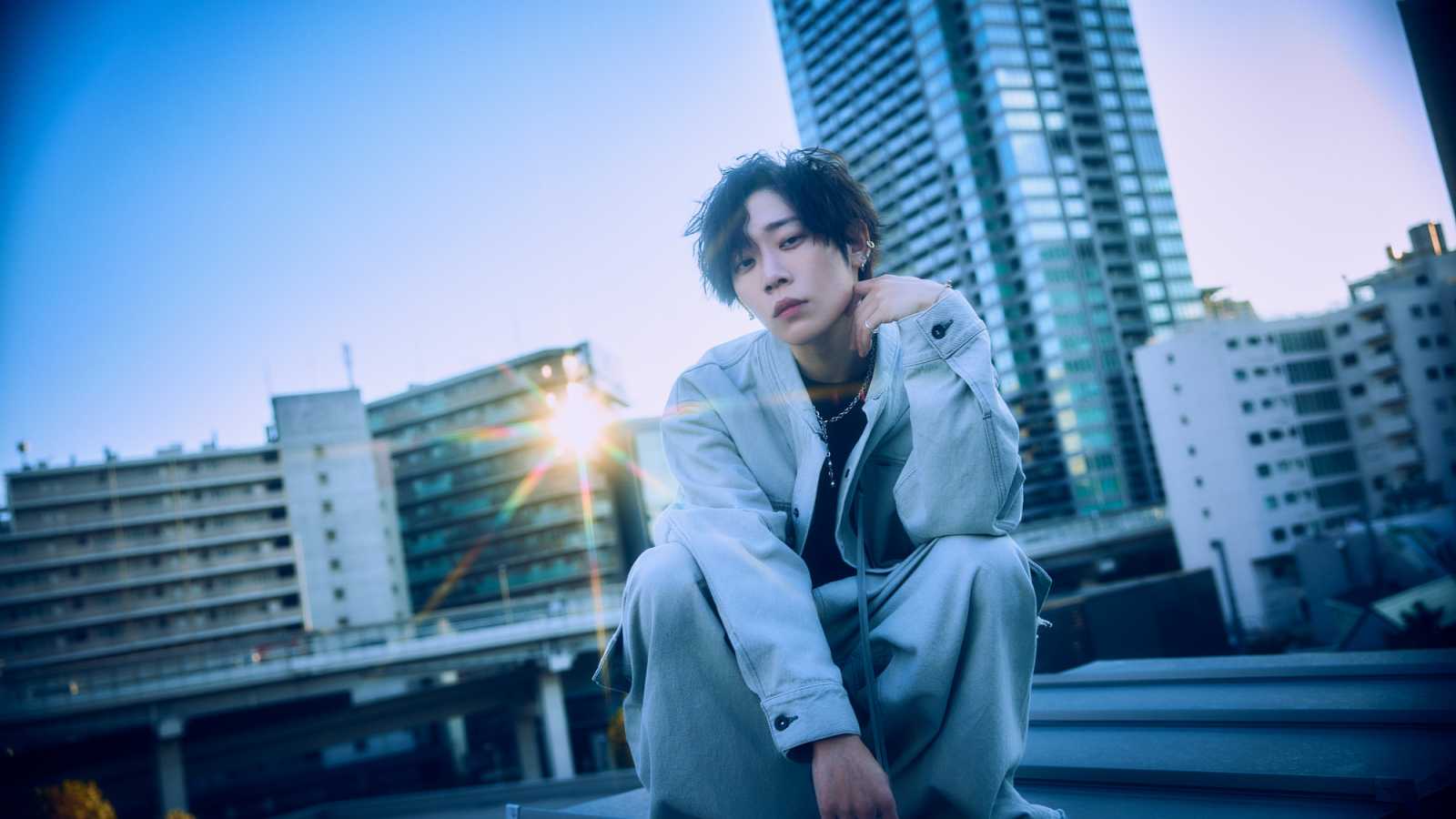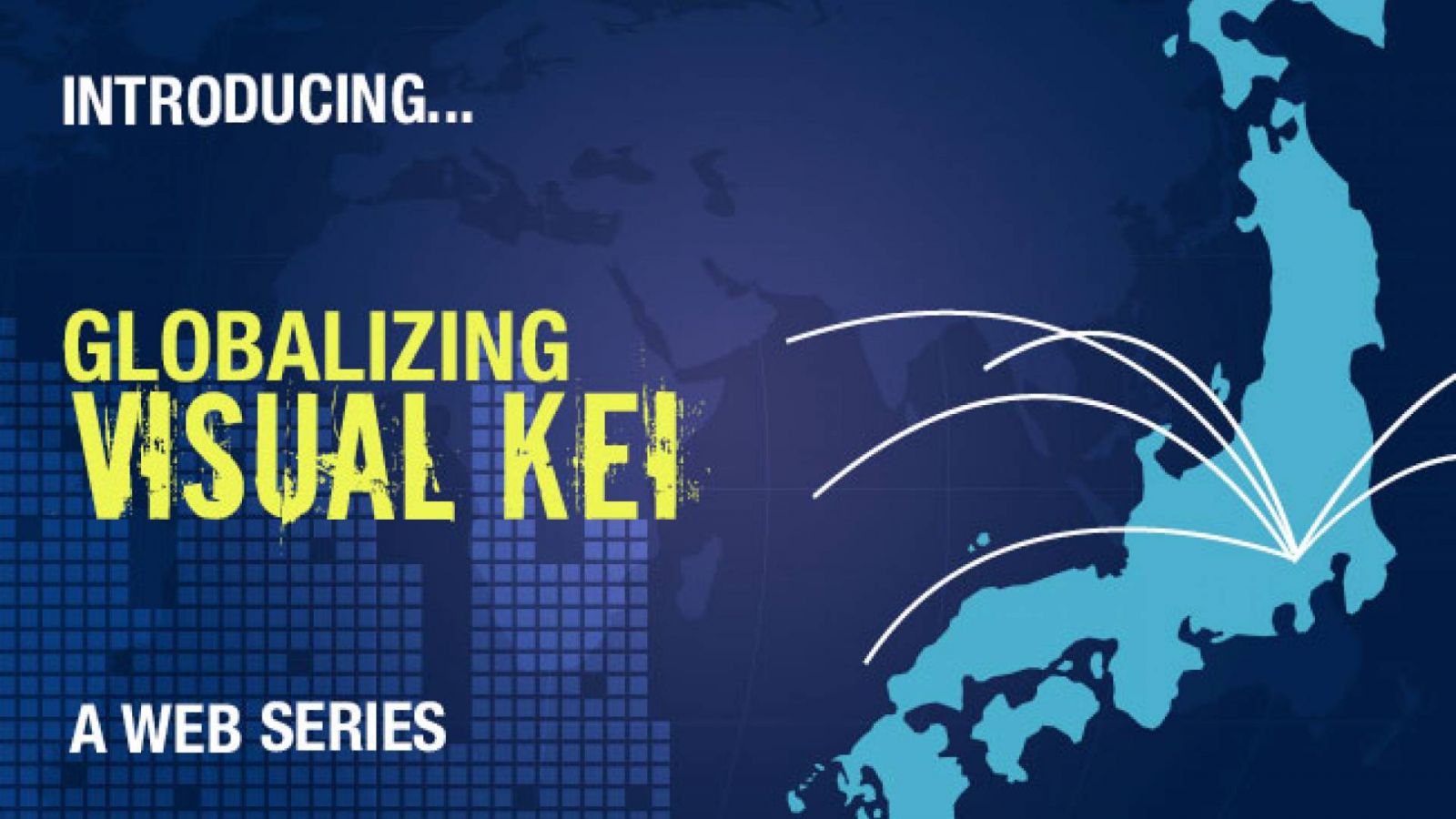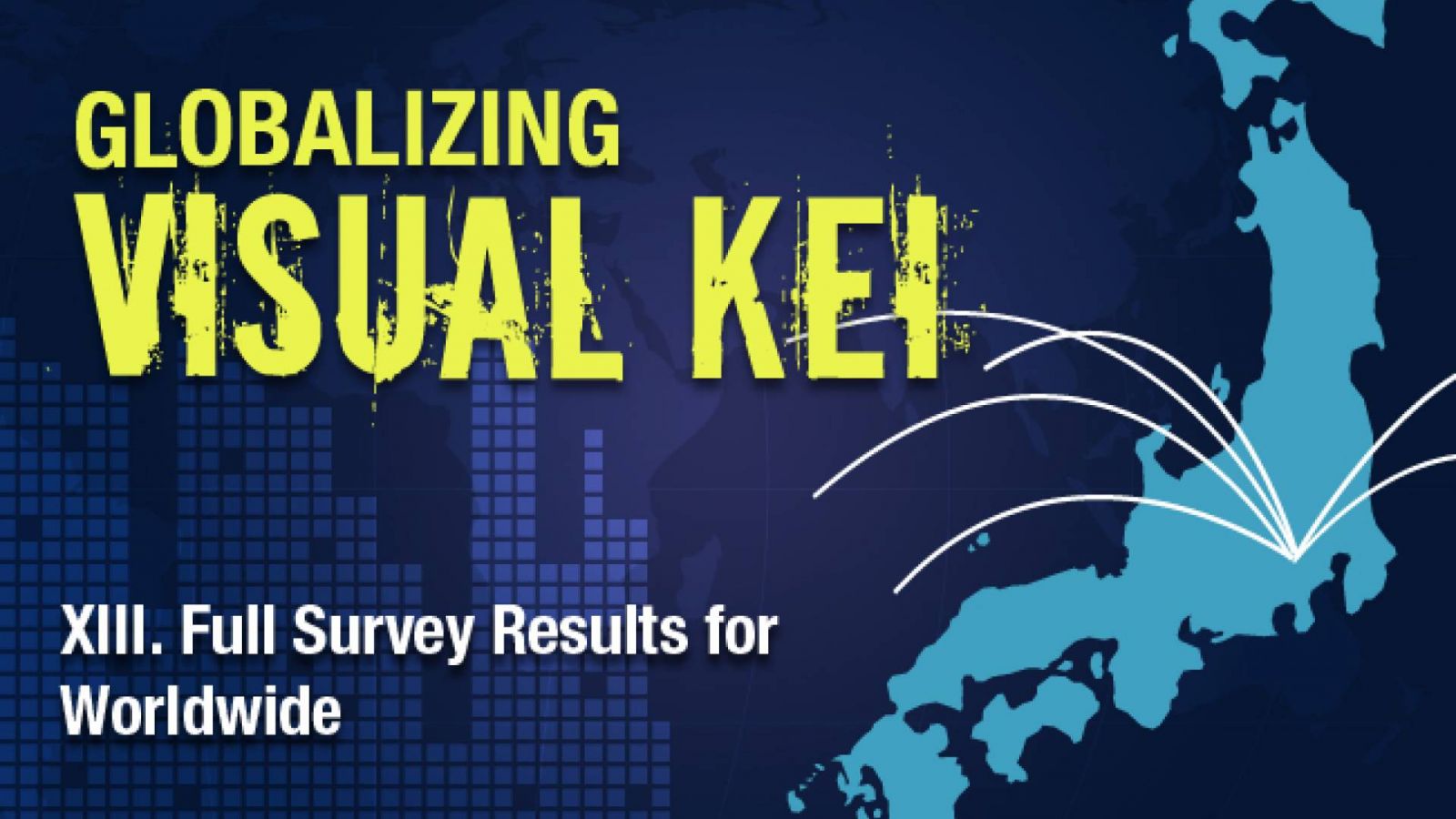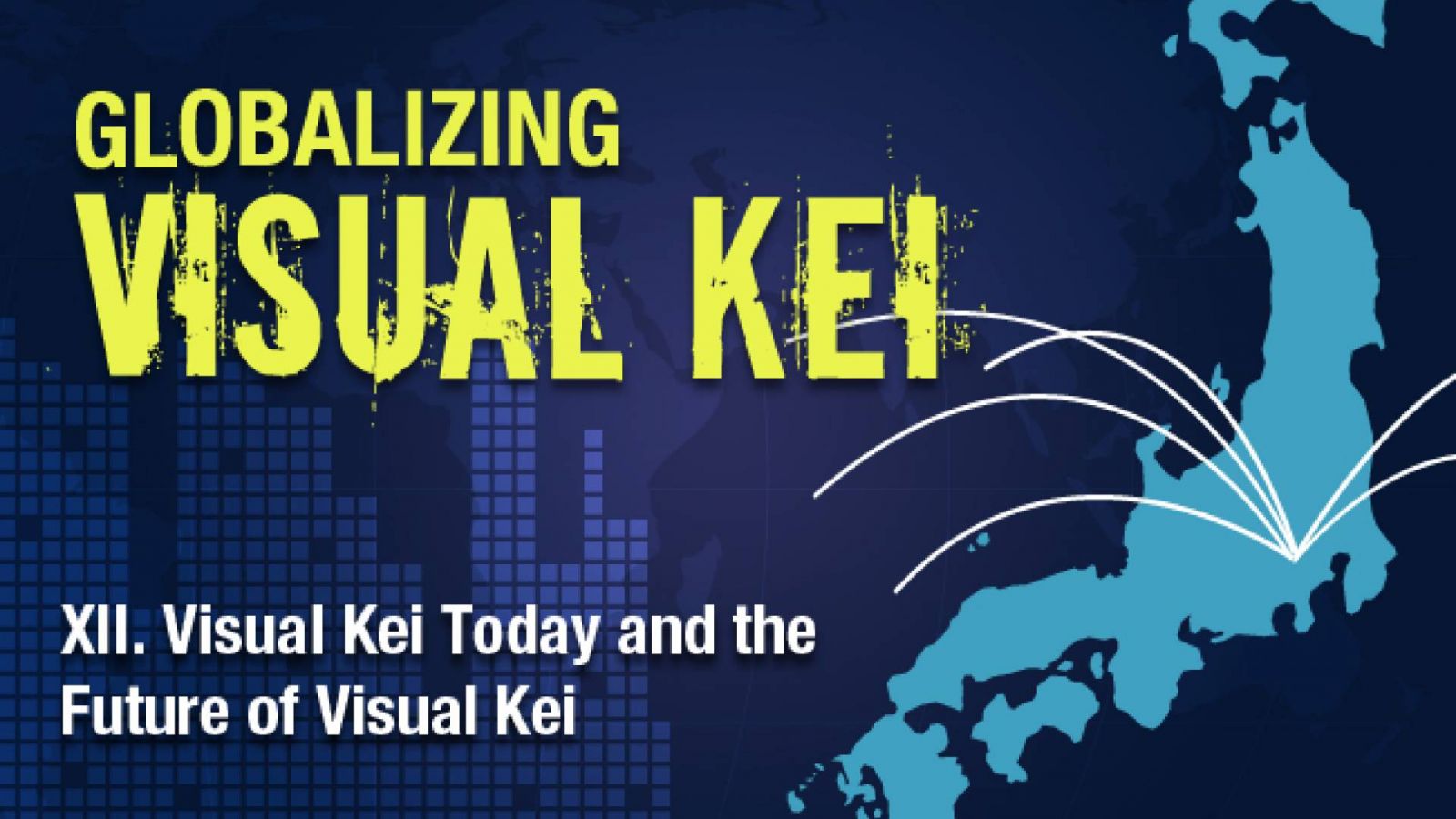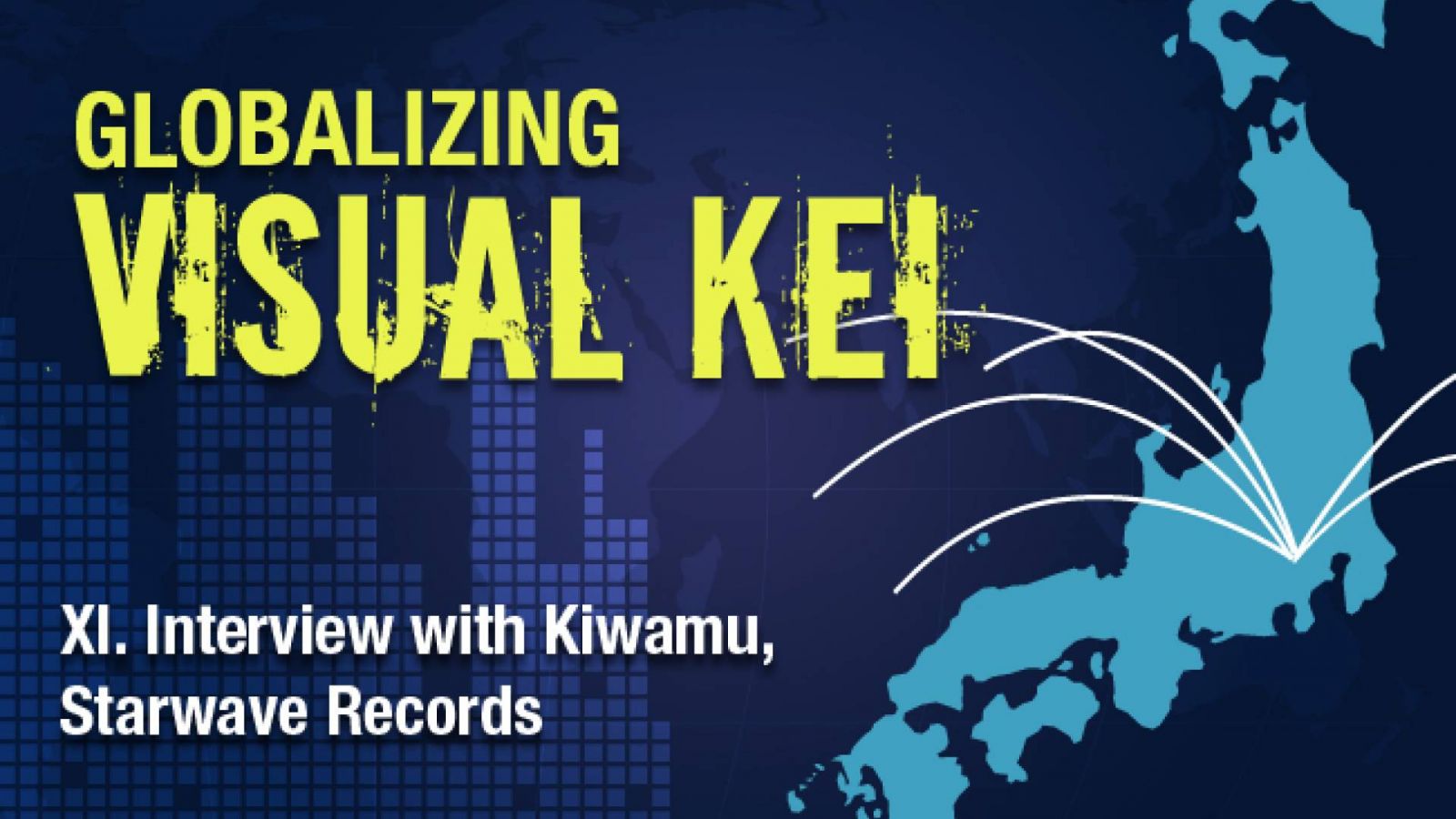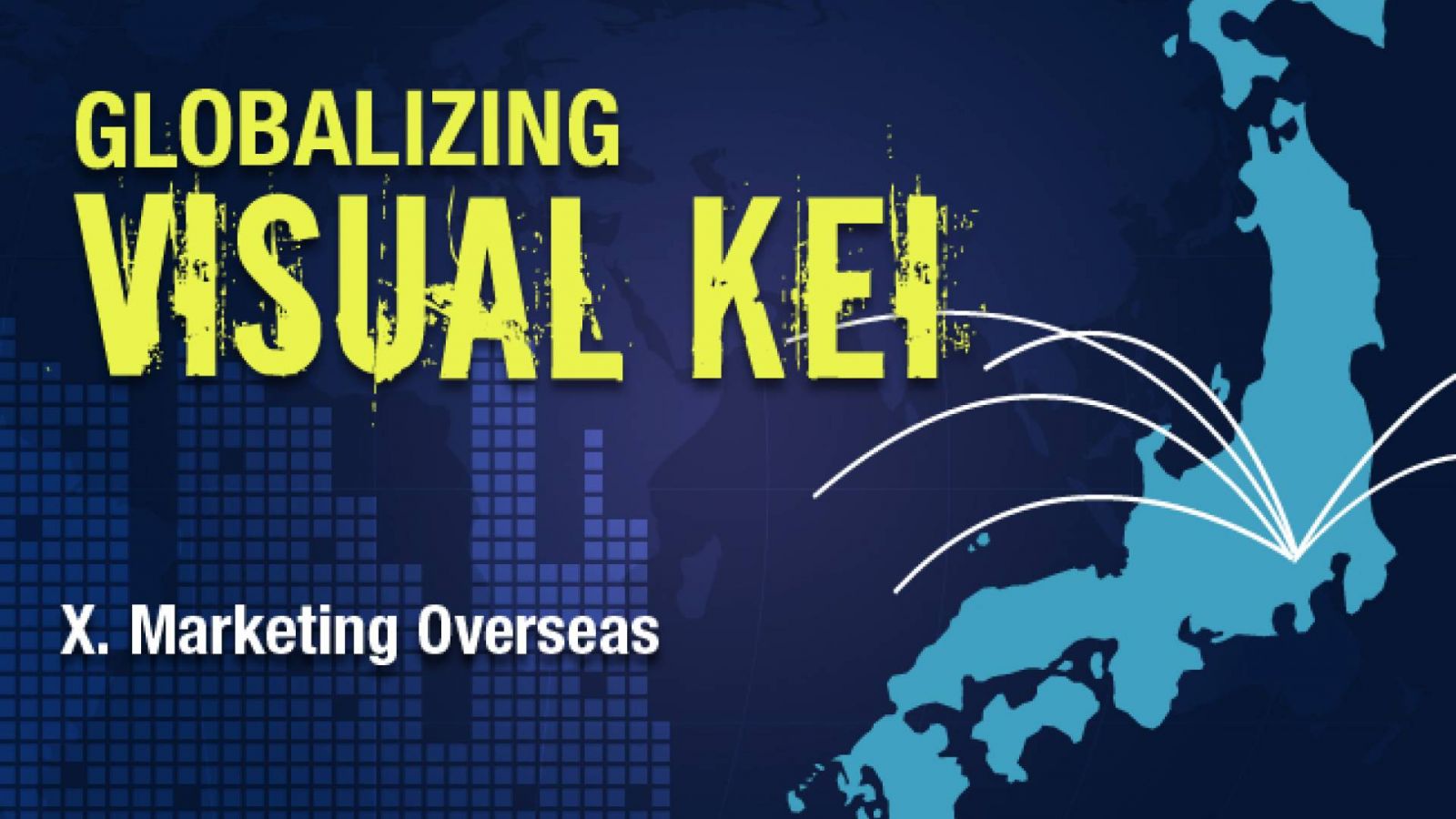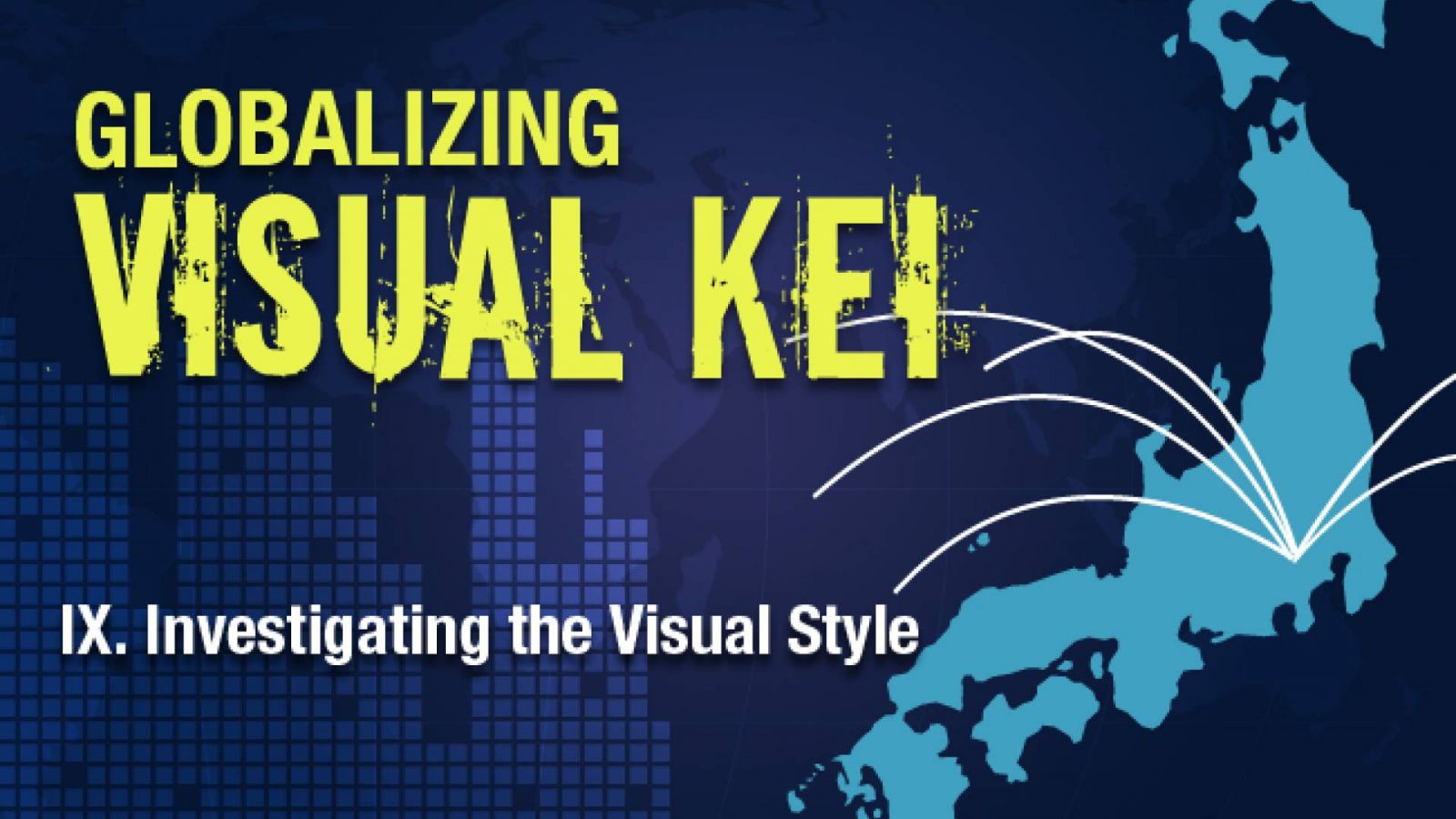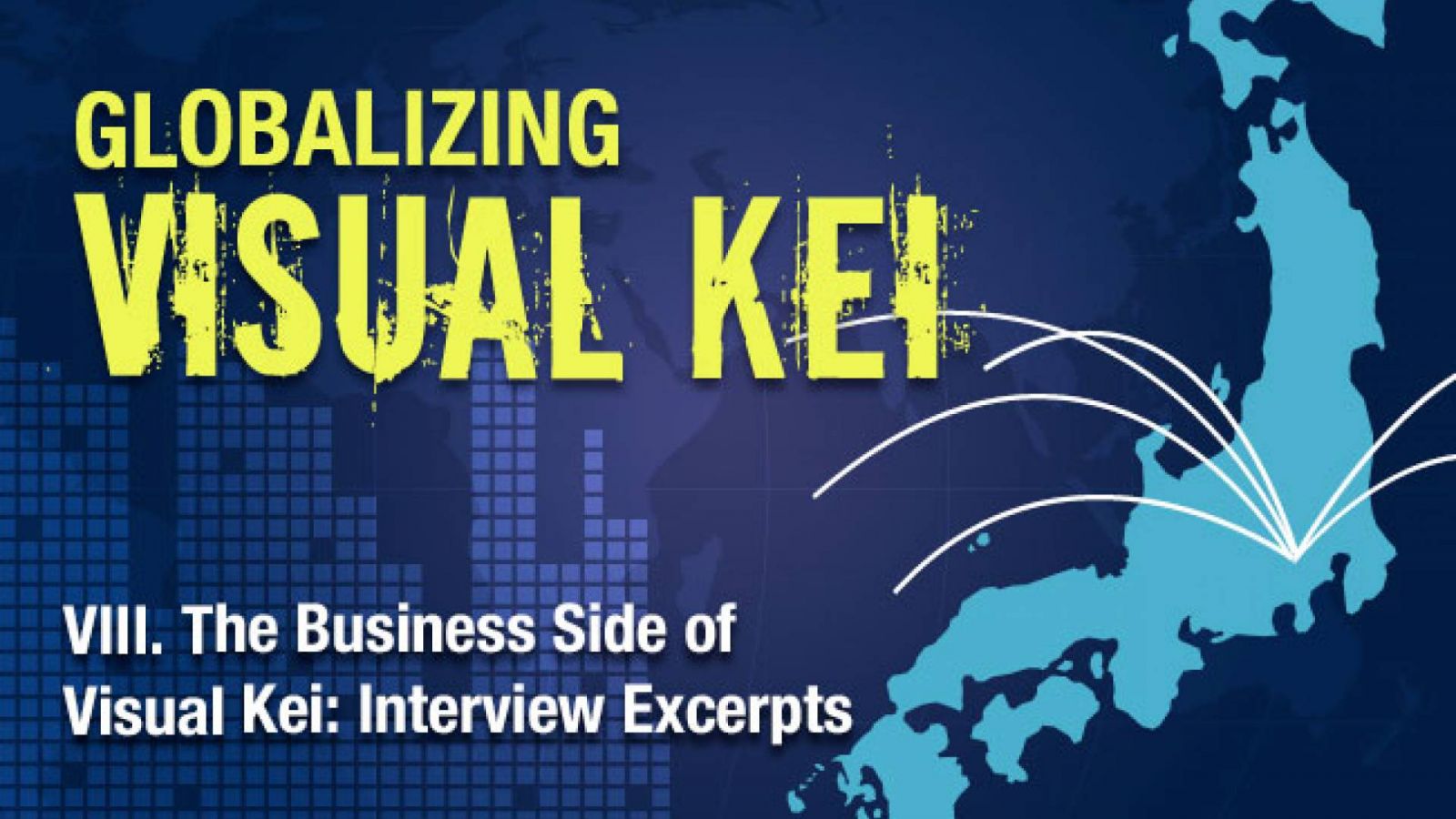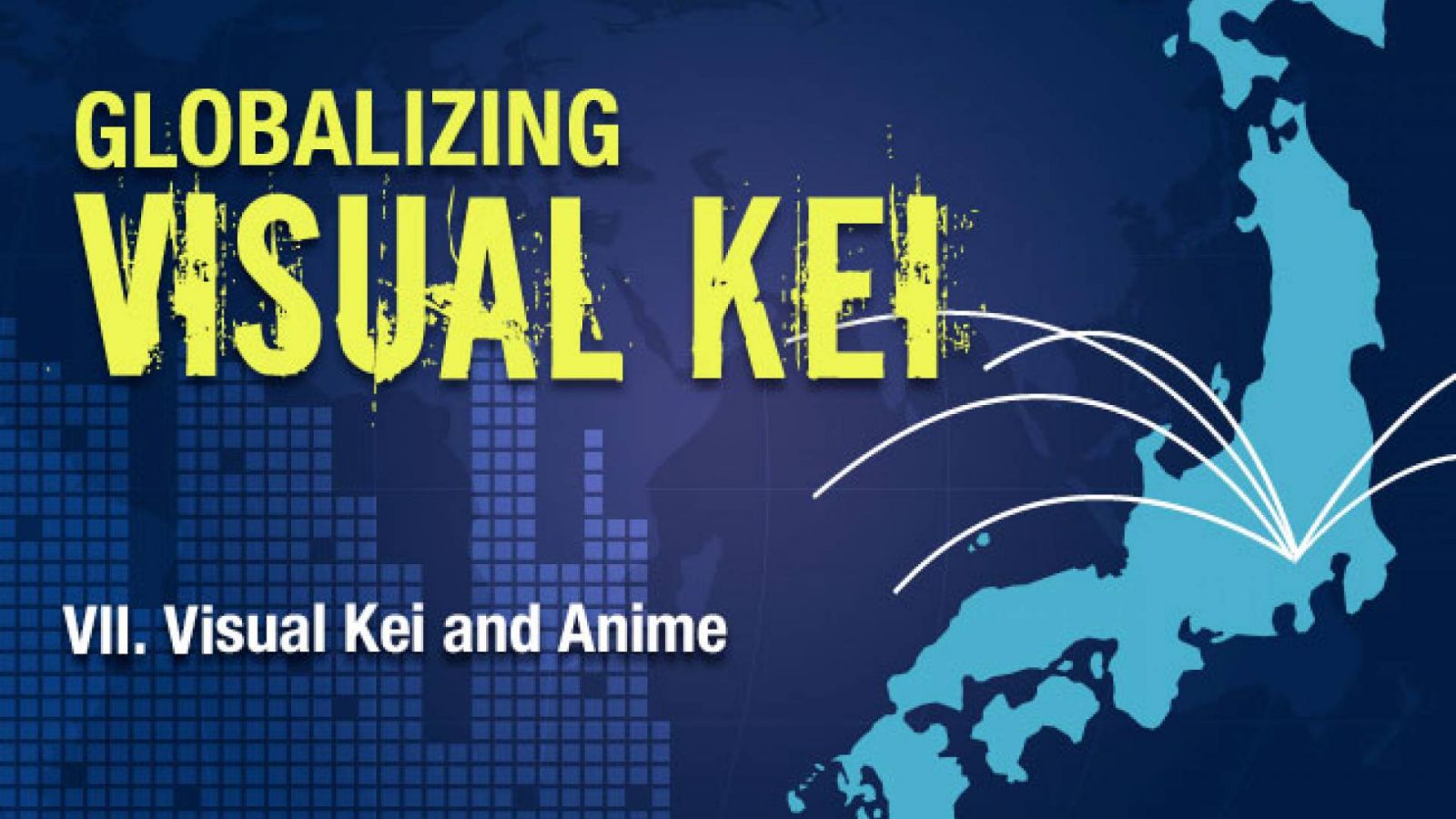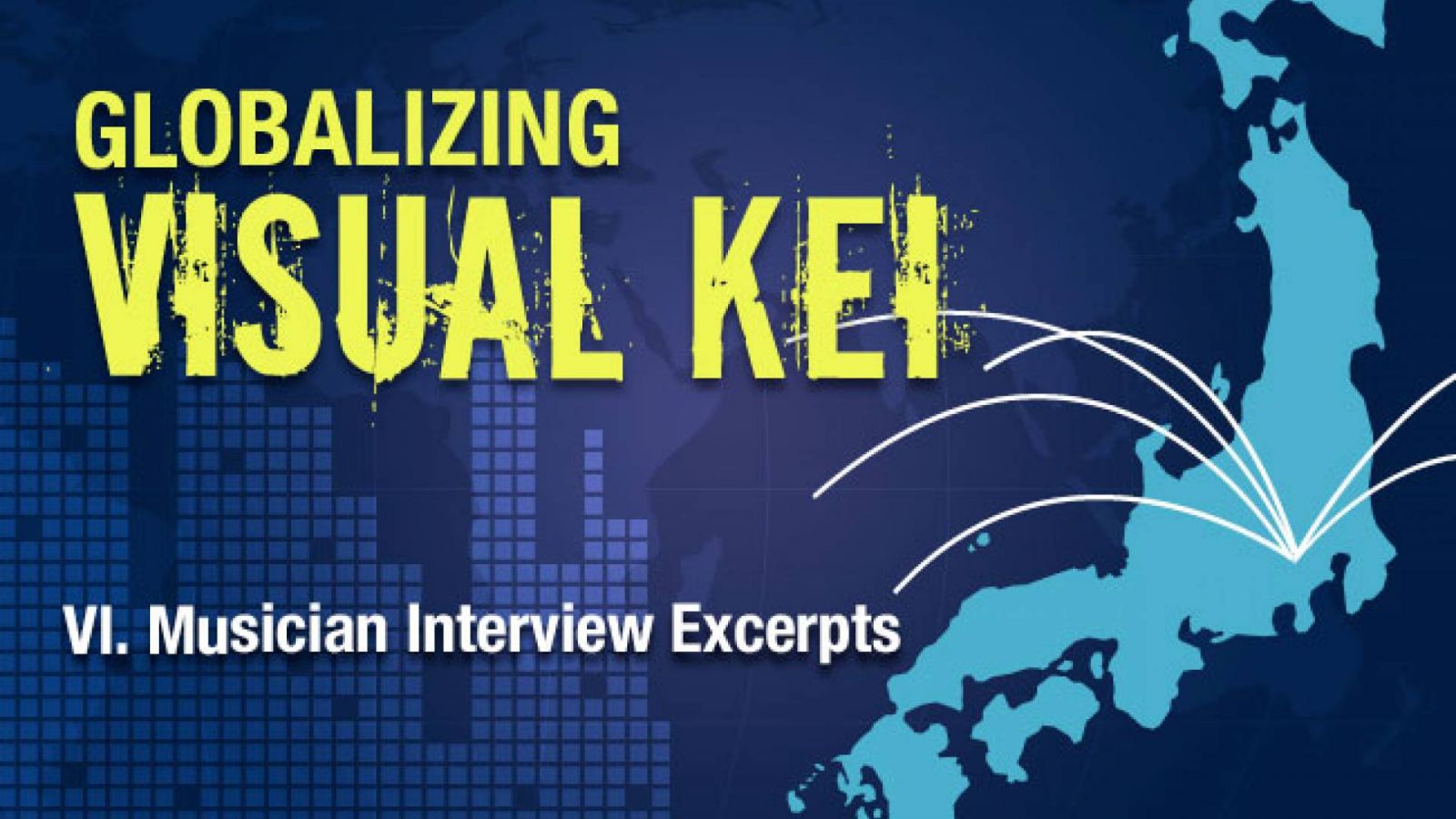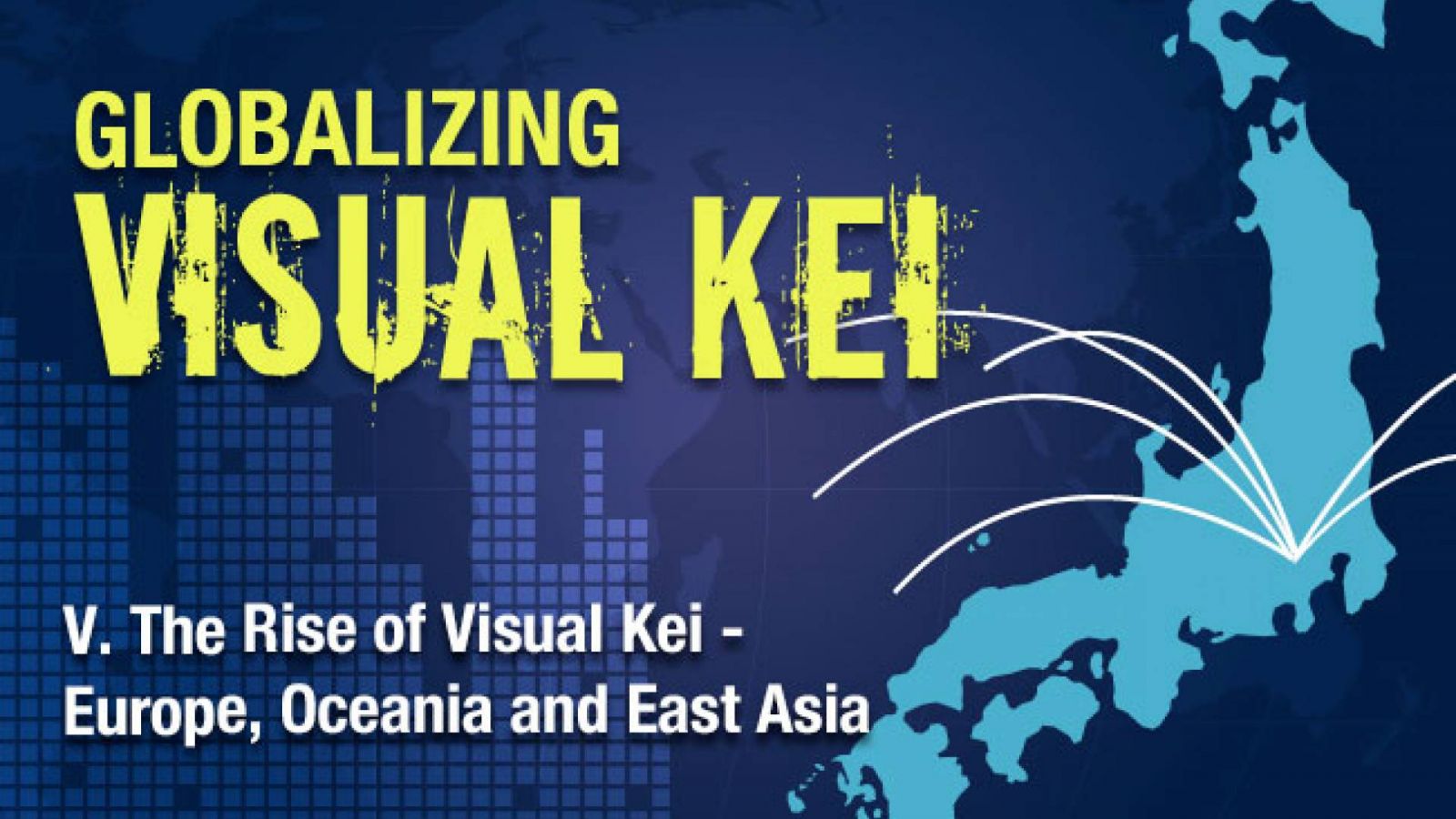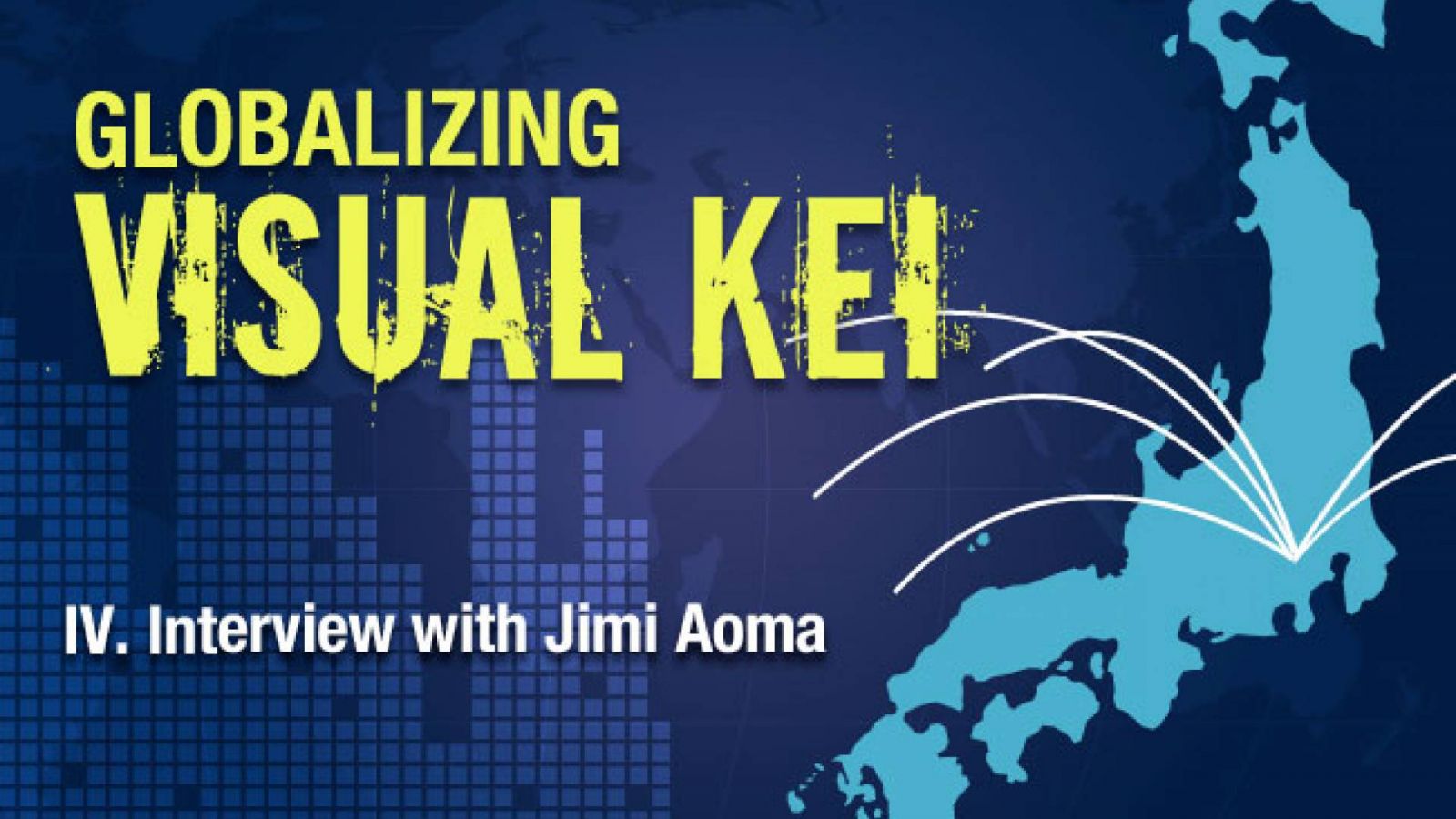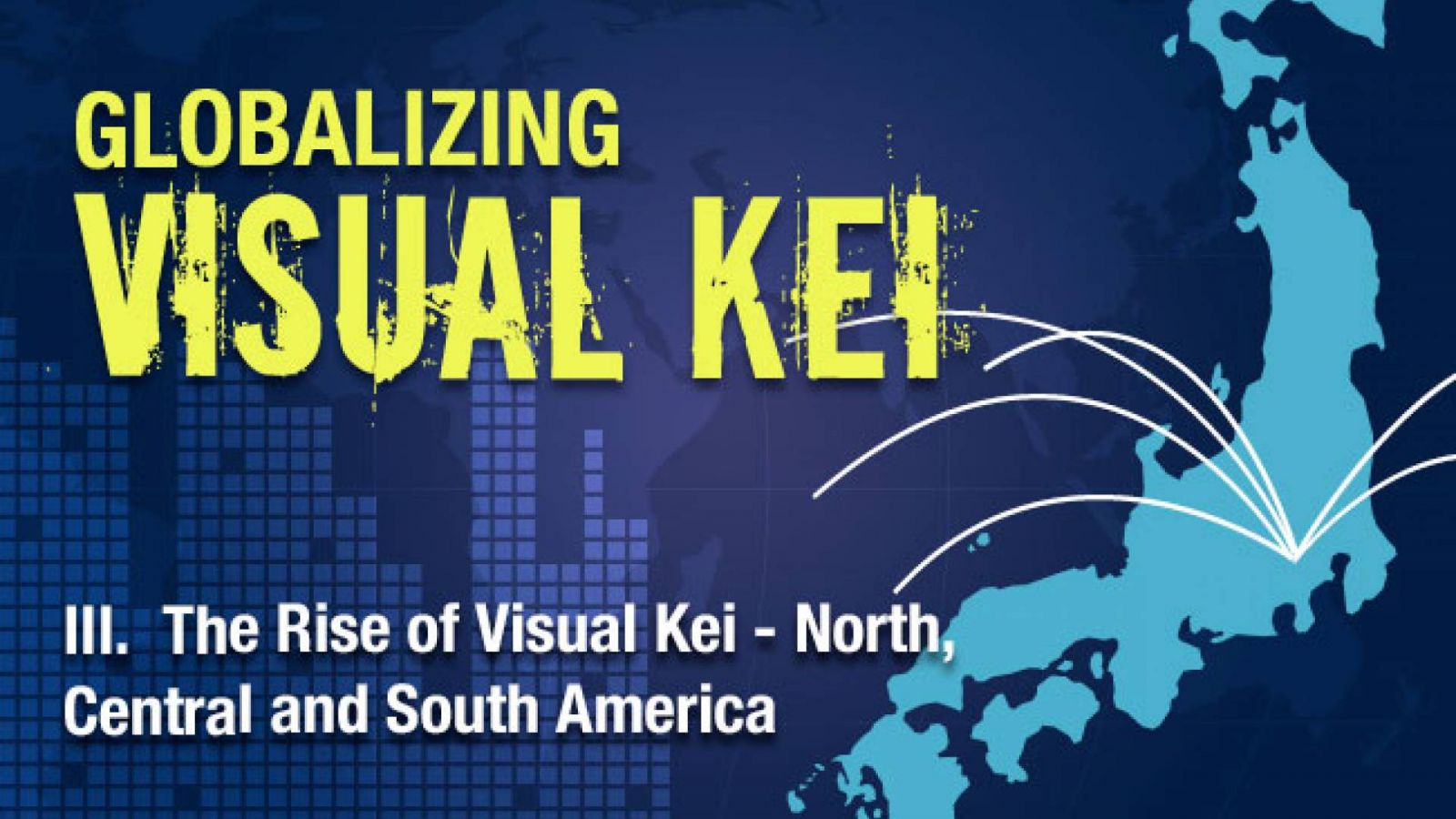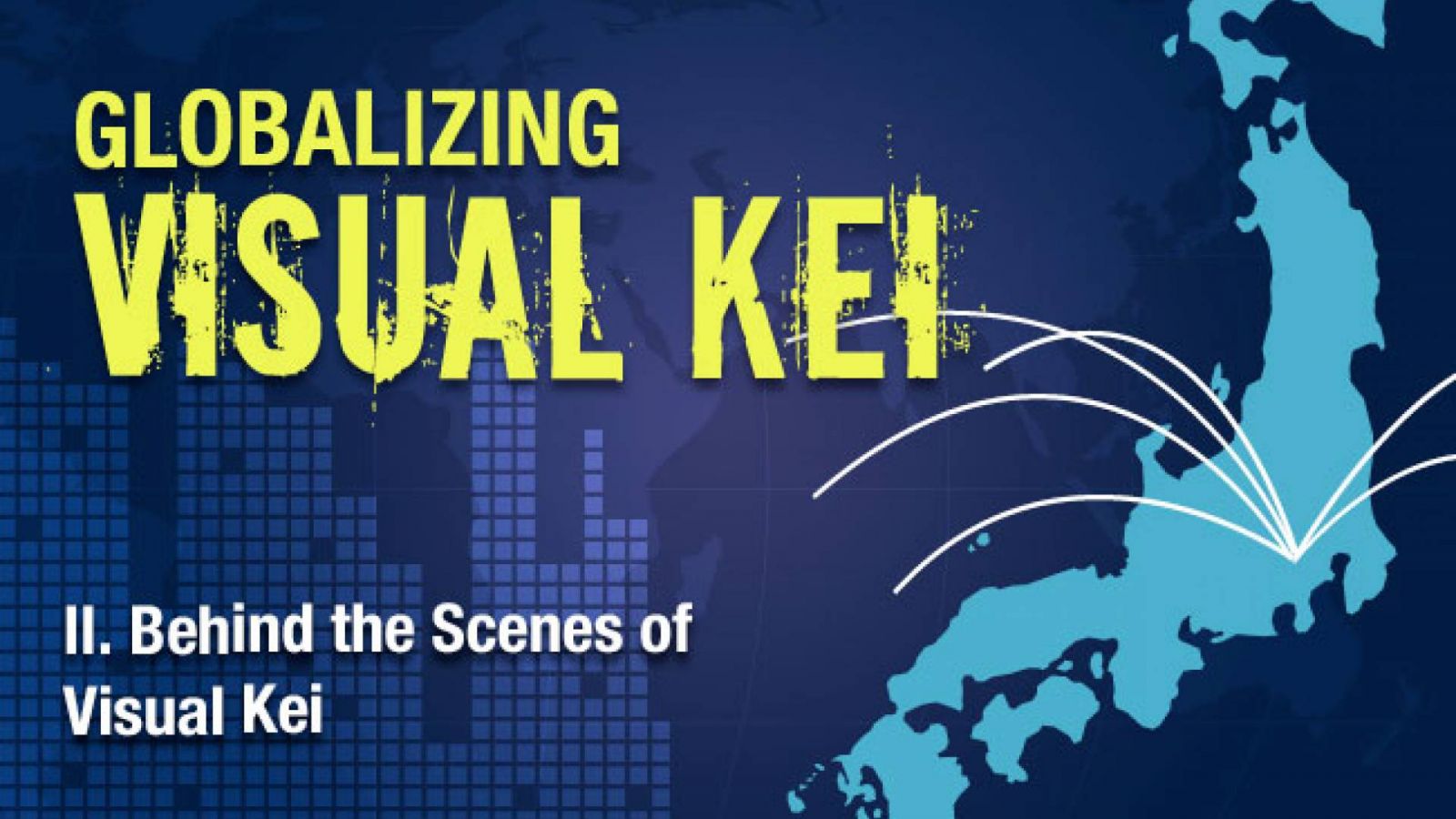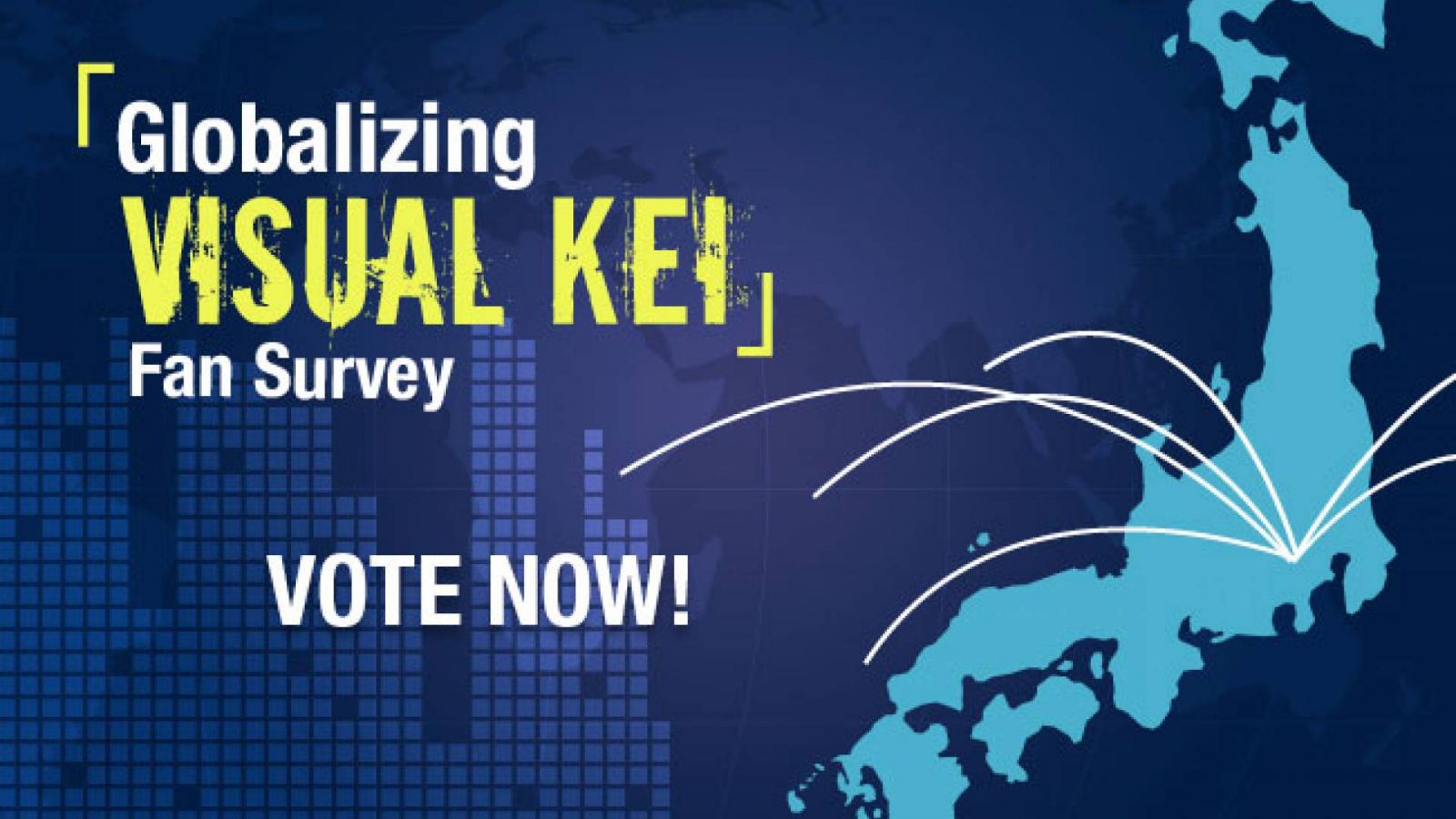In early spring 2011, JaME had the opportunity to interview
Jimi Aoma to discuss the visual kei scene, fanbase, and his personal experiences.
Aoma’s experience is unique: a native Californian, he was the former bassist for
Chemical Pictures and worked in the Japanese visual kei scene for over four years. Today,
Aoma lives in Tokyo and currently plays for several artists, including
Steve Appleton and
Tommy heavenly6.
Why did you choose to be in a visual kei band instead of a regular rock band?
Jimi: It started off pretty randomly, just like almost every decision in my life! I'd been in bands in America, and we'd do some psuedo-theatrics, I guess. One of the bands I was in was pretty goofy, another a bit darker, and I was an actor and singer and had played leads in quite a few plays and musicals and it just didn't feel right standing there in a t-shirt strumming my guitar and crooning. So we tried a few things.
I had heard of visual kei throughout my Japanese studies and definitely had some bands I liked, but musically I was more inclined to other genres. The first band I tried to join was a progressive metal band, but they decided to break up instead of hire me! Mostly I was just going around to a lot of different practice studios and looking at their "musicians wanted" board, pulling down ads for people who wanted bassists, guitarists, keyboardists, drummers, vocalists; I didn't care, I just wanted someone to judge me as a musician. I had talked with a lot of bands who were either skeptical about having a “gaijin” [or “foreigner”] in the band, or
too enthusiastic about having a gaijin in the band.
One of the bands I'd spoken to listed a lot of western metal guitarists and
LUNA SEA as favorites, and it turned out to be that sort of European neo-classical visual kei band! Luckily the guys were really nice, didn't say one word about whether I could speak Japanese or my foreign-ness. I just found that so refreshing. I networked and met a lot of people that way, and while almost anyone you meet in Japan is kinda going to stare at you and say stupid things to you at first, the people I met in the visual kei circuit were some of the most understanding and most interested in what I could do as a musician. They just saw my foreign-ness as a part of who I was, not the whole of who I was.
Maybe things would have been the same in another genre, who knows. VK is the only genre I've had experience with, but a large majority of guys in the scene are always looking out for each other.
What were the most enjoyable and most frustrating parts of being in a visual kei band?
Jimi: The camaraderie, the fans who seem to like you no matter what, the wonderful, thoughtful gifts, the thrill of performing and getting into a really good groove, pouring yourself into making a bunch of records, hearing it and thinking, "wow I wrote that!" etc, these were all pretty enjoyable.
What was not enjoyable was the lack of money, seeing bands you think are not that good selling way more tickets than you did (no one is above a little jealousy!), the long, draining drives to Osaka, Nagoya or Sendai, lugging tons of heavy equipment everywhere, long weeks in a basement recording, constantly having to wash off makeup, wash hairspray out of your hair, washing your sweaty costume, lack of sleep or free time...
I also sort of felt that, once we picked up and started recording and touring more, I felt like my creativity had stagnated. Before we went into the studio, we had more songs than we knew what to do with. We were all improving our skill sets. And after that I feel like I had nothing more to step up with in that context. So that was sort of a sobering, unpleasant realization.
Another thing I personally didn't find enjoyable was the idea that you sort of have to maintain your persona. I was often advised even to dress up nice if I was just going out shopping, just in case someone saw me. I was advised that if I had a girlfriend not to go to any high-volume areas with her, or to hide her existence. I realized that I'm more concerned with living a real life than living a fake one.
Did you encounter any criticism from fans or other band members (Japanese or overseas) for being a non-Japanese person in a visual kei band?
Jimi: I don't get any criticism anymore (or at least I don't see them!) but in over three years I have had only one Japanese person say anything even remotely mean. I got a message on my old
Chemical Pictures Japanese blog from a Japanese girl that said, “Go back to your country!” which is just laughable, harmless xenophobia. The vast majority of criticism I received was from western people. They said I was ugly, they said I was an idiot or a jerk, they were all-in-all highly against the idea of a non-Japanese in a Japanese band. The truth is that I am not the first, not by a long shot.
Ben from the old
Chaos System, the brothers from
MONKEY MAJIK,
Shen from
Def Tech, and
Jero. So there's precedence. Why was it different when it was visual kei, and a more visible visual kei band?
I didn't let it get me down, though; for every one of those messages I got, I got tons of really supportive ones that were really quite moving. I try to ignore the mean ones. The best way to respond to them is to try to continue being a nice person and a good musician. I don't know how well I pulled off either, but I tried. I can't really explain why someone would want to send someone a mean message to someone else without hearing any of the music and just based off of a picture.
Can you share any stories of negative experiences you may have endured, from either being in costume or discussing your profession with friends, colleagues or family?
Jimi: I was very, very lucky not to face any negativity either within the scene or within my circle of friends, family, or co-workers. I was very open with my family about what I was doing and what it entailed, and I think they appreciated that. They also knew I was a good kid, and had something to fall back on if music didn't work out. As for my friends, I'd always run in a relatively artistic circle so there was no problem. And though I tried to keep it hidden, my co-workers thought it was cool that I was in a band and they could search for me in different videos all over YouTube. The visual-ness didn't seem to matter, and it helped that
Chemical Pictures isn't what you might call a typical visual kei band, in terms of looks, or sound, really.
The only negative things that creep up are your perceptions, as you have to begin to see your fanbase as numbers instead of faces if you start having a little bit of success and there is pressure to start bringing in more buyers. This is strictly an inward personal thing, though.
What was your most successful event?
Jimi: Our most successful event might have been our one-man at Ikebukuro Black Hole on March 14th, 2010. We were announcing our big five-month CD release schedule and there were like 200 people there, and lots of good friends came too, and it was all in all just a very solid performance that we were all very pleased with. Our one-man at Shibuya O-West in September 2010 was a lot of fun while we were playing it, but everything leading up to it was so stressful!
Did you ever have any tours or specific shows which caused the band and/or event organizer a capital loss? What do you think may have caused this?
Jimi:
Chemical Pictures didn't, but in my band before we often never sold the requisite 20 tickets and had to make up the difference ourselves. Once I joined
Chemical Pictures and we started playing higher-profile events, there was never really a loss. At least, not for the sponsor! And they're often selling merchandise on the side. So I mean, once you have merchandise to sell and you're at the small level we were, you're never really making a loss, and you're not just breaking even, but you never seem to really catch a break though.
That show in September that I mentioned in the last answer, though, we had our eye on ticket sales for a long time and they were climbing so, so slowly, so it was a huge relief when the day before we got a nice bump in sales. It's stressful when you announce a show
so far in advance and you're tracking ticket numbers obsessively, because heck, I don't even know what I'm going to do tomorrow, let alone some Thursday night four months from now.
Visual kei bands often complain about the lack of money within the business. On a regular basis, how much time and money do you think is invested into the band in a month? How much money is usually made in that same time frame?
Jimi: I was not in charge of handling the money side of things, so I don't have exact numbers for how much we made, but you can look at a ticket price for a show, calculate that "50% from the 21st ticket onward" and sort of plug in numbers to see what a "good" or "bad" night might be. Plus merchandise. We never took anything for ourselves and all money from shows went into our little band account that we used for gas or other activity-related expenses, sometimes hotels when on a tour. We personally handled all instrument, rehearsal, food, etc expenses ourselves. Sometimes we would dip into that band fund for something equipment-related if we were really strapped for cash, but we always tried to pay it back.
On top of that, we borrowed from our label to make the CDs, and then we'd have to pay all that back from sales, and then they'd have to make their profit, and usually they didn't. Japan is still pretty obsessed with physical CD sales, and while I tried to push digital sales, they were pretty apprehensive to think about it.
Unless you're pulling in huge crowds every night and selling tons of CDs and somehow not wasting too much money on paying to secure a cover story in a magazine or are willing to invest in some good ad pages in the magazines, you aren't seeing a lot of money coming your way. If you're doing really well, your management will give you a monthly stipend, but it's usually not exactly enough to quit your day job. I can say that we'd rehearse twice or three times a week, which would cost a small amount per person, plus your train fare, so that adds up.
Did you or Chemical Pictures ever learn anything specific from other Japanese bands and/or Japanese event organizers about how to be a successful visual kei band? Is there anything specific you think overseas organizers should know?
Jimi: Some of the problems I think we faced, and I think we
know we faced, were that most of our members had been in relatively successful bands before.
KuRt was pretty popular, as was
SCISSOR. So I often wondered if they and other band guys like them were sort of stuck with the idea of how things were done in the time frame in which they had done pretty well; ideas which might not work in today's business realm. And that can be a problem because they might be more apprehensive to try a new (or risky) approach to business.
Another thing I'd suggest to overseas organizers is that more often than not, we band dudes don't really know anything about the logistics. You're going to be dealing with their management anyway. What I'd suggest is, be up front with how things are typically run in your country, ask them to tell you how they are used to things being run in Japan, let them know your expectations, hear theirs, and try to come up with some sort of compromise. So much of how things are run seem to be so vastly different. Korea was easy for us; I even think I'd have a hard time adjusting to coming and playing a show in the States.
This may just be a personal thing, too, but often times I hear about bands that are going to play at some convention or whatever and I think, I have literally never heard of these guys, and this con is giving them tons of press. They may not even be good. Is this a budget thing? If you take a look in a magazine and pick a band with a decent spread toward the back of the magazine, why didn't you go with them? If you take a young band and take them overseas, they often come back to...nothing. Because now their whole fanbase is only in one country, not their home country.
Another thing is, I hear a lot of horror stories and I guess I sort of wish more organizers, staff, etc. were able to separate their existence as a fan from their existence as someone there to help an event go smoothly. I've gotten pretty good at being able to tell when someone is just trying to do a good job with something they love, or if they're just trying to get close to me for inside information or to be able to say they've hung out with a J-rocker or whatever!
Did everyone in Chemical Pictures have at least one part time job outside of the band? Was it ever more than one?
Jimi: Pretty much everyone in
Chemical Pictures had jobs, and there were times when we were getting really busy that someone would quit their job and find another when things calmed down for a little bit. Gotta pay the rent. It was easier for them since they're Japanese and can sort of do any old part-time thing, but for me, it was a bit harder since I have to essentially prove that I can do things that your average Japanese employee can't, plus other requirements pertaining to visas etc. I didn't like having to balance that.
Most of the time band dudes do data entry or work at a store, restaurant, construction or delivery. It might have been hard for those with crazy hair and piercings and tattoos to find a relatively normal job. I was a kindergarten teacher (which was awesome) and a translator and now I still do translating and another full-time job, and occasional bassist/guitarist/keyboardist/drummer/whatever for other musicians, but that's just because I still like music, I just don't know that I want to be "the guy"! Also, all those music videos/commercials I used to be in don't really make great wages unless you're doing a lot of them, or a few really high-profile ones.
Let’s talk about the visual kei scene more generally. What are major misconceptions you believe fans have about the visual kei scene, including bands and management?
Jimi: Visual kei may be popular in a corner of the internet but other than a tight-knit community here it's not on the national stage at all. Visual kei dudes work for a living, often full-time, and if they don't they're living off their parents or girlfriends. Visual kei dudes sometimes have girlfriends or are married. Fans do not like this for whatever reason. When a given female celebrity I'm into gets married or is dating someone, it's like "oh bummer!" but it's like, not a
real "oh bummer!", because who are you kidding, really? But for some reason, the idol fandom business in Japan does not take kindly to this at all.
Visual kei bands don't really think about "visual kei" too much. It's just sort of a banner under which people who can finance the bands and keep the magazines/stores/etc running came up with to capitalize on the phenomenon. "Capitalize" etc sound like a dirty word, and I am a hippy-dippy liberal, but that's just business and I'm fine with that.
It costs money to do everything, even to get on the cover of a magazine, which is often why you see the same bands month after month. Even when a band goes major, they're often still managed by the same tiny little management office, it just means they get bigger print runs and wider distribution. So many visual bands have gone major that it doesn't really seem to mean much anymore.
I'm sure there are lots more, but I wonder if this doesn't have to do with misconceptions about visual kei or Japanese music and more to do with misconceptions about how music business and/or business in general works as a whole. I'm no expert either, though.
Why is visual kei generally described in a negative light in Japanese society?
Jimi: So much of the original visual kei imagery and fandom comes from a fairly dark place, I think. Early on when the more gothic styles were thriving, you saw a lot of blood, death and pain -- even some Nazi imagery. A lot of the band names expressed some pretty gruesome concepts. Its fans were typically like “lost children,” perhaps emotionally distant, emotionally stunted or hurt, and concerned with expressing themselves outwardly in less-than-normal ways with their hair, clothing, and makeup choices. Since the vast majority of visual kei fandom is female, the entire market is geared toward that demographic.
At its peak, some of the more "shocking" visual kei bands would appear in highly visible places, on the highest-rated music showcase television programs, etc. The visual kei that remains in people's minds is the shock-rock
X JAPAN, the sexy swagger of
LUNA SEA, and the gender-bending
SHAZNA; understandably a lot of parents were concerned. You have to think like a parent sometimes, I suppose. All of my former band mates have stories of seeing
X or
LUNA SEA on TV and hearing their parents tell them “please don't grow up to be like that.” Luckily as they grew up in bands their parents turned out to be at least a little supportive of their dreams as long as they're staying out of trouble, but I can imagine that as a parent your mind jumps to the seedier aspects of the music industry associated with the more out-there genres.
As you can see by looking at the magazine covers, visual kei is no longer the dark, drippy, heavy, gothic-tinged beast that evolved in the 80’s and early 90’s, but it is also not nearly as visible a craze as it used to be. It really has carved out its niche. In an era when everyone is connected technologically and it is easy to seek out and find like-minded people, it is no longer necessary to be in the national eye to make a buck. This means that when people relatively unfamiliar with it hear the term visual kei, they think back to what they remember the most.
As a simpler option, a lot of times people simply think that the obsession with looking good or looking strange on a constant basis is highly narcissistic. I won't deny that it's almost too easy to sit in the makeup chair for an hour, wearing clothes designed by someone else, looking at re-touched photos with good lighting and think, “damn, I look good.” That can lead to an attitude problem I suspect. I guess my theme with these answers is that, it goes both ways!
What do you think caused the sudden interest and acceptance of visual kei overseas in the past decade?
Jimi: Far and away, the Internet. When I started learning Japanese when I was younger, a lot of my Japanese and Japanese-American friends were listening to music from Japan via the Internet. In this day and age, more self-contained, self-sufficient niches have formed than could ever have been supported before the advent of the Internet. Advertising costs would have eaten up all your money, I suspect.
I am an extremely normal guy so this is all mere conjecture, but I think it helped that modern scene or goth kids evolved just as something with similar aesthetics (visual kei in its then-current configuration) was poking its head out overseas. Plus, being conscious of the niche nature, some people got really admirably rabid about letting people know about this crazy new music they'd found from Japan. Obviously their enthusiasm meets with lots of resistance, but I remember years ago when fansites were all over the internet. Those were the gateways. Once you find a community of people who have felt alone and awkward in their teenage years, they band together really strong. You see this across all sorts of other things, for better or for worse. The world is too big and full of too many different kinds of people for any one thing to gain universal acceptance, and I think most people have sort of tacitly accepted that. I think people feel a lot more free to get really into a lot of different things, in order not to feel so small and alone.
In the past few years, interest in the US has decreased but remained steady in Europe, including a recent spike in interest in visual kei in Eastern Europe. What are your thoughts on this? Do you have any explanation for the growth?
Jimi: I've spoken to a lot of different bands about this, and even draw from my own experience as an American, and having played in a few states in my old American bands. The fact of the matter is that the US is just too huge. No matter where you play a show, it is inaccessible to a lot of people who would otherwise really, really want to go. They'd need to catch a flight, rent a car, drive their own car thousands of miles, etc. Other than a few big cities, there isn't really a reliable mode of public transportation. The costs are just too great for a 16-year-old from Nebraska or something. Even I rarely ventured out of my own hometown to go to a show, even if I really wanted to see someone. I'm from California, and from the Central Valley, so getting to either San Francisco or Los Angeles was a huge ordeal just for one show.
I have never been to Europe, but I gather that it's a lot easier to get around from country to country, especially with the EU in place. The countries are much smaller, and it seems that European underground scenes can gain a lot more traction simply because of geography, disregarding different attitudes for a moment.
For the bands to go over takes a lot of money. You have to play more than one show for it to feel worth it (from an emotional standpoint) or be worth it (in terms of money). In America, you might have enough people who want to go see a show all across the country, but no matter where you play you probably aren't going to sell enough tickets for it to make it worth anyone's time, unless you do a big, involved tour like
DIR EN GREY or
D'espairsRay.
Many fans complain that bands do not come to their country and accessibility is limited, yet they want the scene to remain small and intimate. Do you think there is any middle ground achievable?
Jimi: It totally sucks if you really want to see a band but have no means to do so, but that's more of a personal problem than anything. It takes so much preparation to do a show of any nature outside your country. When we played Korea, we were submitting documents for visas super early, getting stuff in order, figuring out what staff to take along, what we could bring...we flew the same airline from Tokyo to Seoul and while we were allowed to bring our guitars on the flight TO Korea, coming back home they told us we'd have to check them... we had not brought hard cases because we'd been told we'd be able to bring them on-board just fine. So I was having pretty heated conversations with various representatives and there was Korean, Japanese, and English being spoken all over the place and only me in the middle able to speak at least two languages!
If we had been a bigger band we would have just hired someone to take care of everything, but as it is, small bands do it all themselves. And then ironically, the bigger bands often never really seem to make an effort to play overseas because they have a good thing goin' back home.
I think the only middle ground is, accept that you have decided to follow something that is super niche, so just consume what is within your means to consume.
Nathan Reaven of the legal Japanese MP3 website Hear Japan issued a letter to fans which said that “illegal downloading is killing the visual kei scene overseas.” What is your opinion on this issue?
Jimi: First off, I've worked with
Nathan before and he's a great guy and I respect him and his business a lot. I think he's fighting an uphill battle, but if anyone can do it, he can. Also, I believed in the spirit of his letter, if not the tone. I
do think it's fishy when your sales figures don't match the number of people saying they're listening to a release. As a musician, starting out, I really don't care that much if people download. I think we're at a point now that people realize that you have to support your niches financially if you want them to keep making money. No more being surprised when a band whose entire discography you downloaded for free breaks up.
As an artist, I don't care if people download, because first and foremost we just want to be heard. We want people talking about us. We want a core fanbase that will buy our stuff, then encourage people to buy it. I like it because these days it seems to grow organically for the most part. I don't know what a street team is, but what better promotion is there than word of mouth, social networking, etc? And the Japanese music industry, if they really want to break into the western market, is going to absolutely
need to embrace a digital sales format, and not be so aggressive at silencing avenues that are perfectly good publicity. I understand their strictness when it comes to marketing western artists in Japan, but it's just not going to work the other way around.
If you want to move units for less cost, you need to offer a digital format. We had print runs of 1,000 CDs for each release. That's the best numbers/cost ratio that we could deal with. Some bands do less than that. If we offered a digital sales method on top of that, we could recoup the cost of making the recordings that much easier.
Where
Nathan is being misunderstood, or perhaps not making his case clearly, is that I don't think he's claiming that it's killing just the visual kei scene overseas. I'm pretty sure his visual kei sales account for most of his sales at this point, unless things have changed. What I think people need to understand is that he's caught in the middle, between Japanese labels who are resistant to these new distribution models, being stubborn even when he's basically doing them a favor, and young kids without much disposable income who could theoretically afford a digital release but feel disconnected from cause/effect and don't understand the impact of not being a part of empirical statistical data to help ensure that the music they like keeps getting made. While I've made the argument for the power of modern social technology, it unfortunately can cause a huge disconnect. The industry has three options: forgo working through a middle man and start marketing digital releases themselves, stop selling to overseas markets totally, or suck it up and learn how to work with the few companies like Hear Japan.
Nathan’s trying to provide a bridge for companies who don't know how to market to a new subset of consumers, to consumers who still think they're sticking it to those companies. Unfortunately, they're sticking it to guys like
Nathan, who has a pretty good model, if you don't account for people with a sense of entitlement.
I get it; CDs are expensive; but they cost so much to make. All that studio time. Even if you were to do it in your own home, it still takes a lot of time and investment. Some more radical people think that music should be free because concerts are where people make their money, but I don't see the point in that really.
On some sort of flip side, I don't think illegal downloads should be
totally discouraged, because I know of several cases where you snag or borrow a song or several, listen to it for a while, and then think, dang, this stuff is hip, I should buy it, and then they
do buy it. I always think of how
Radiohead did it with
In Rainbows. Granted, pretty much only
Radiohead could have pulled off something like that and still made money on music sales, but I'll just say I've bought and then enjoyed way more stuff I've been able to sample thoroughly than stuff that was a blind purchase.
In your opinion, what would have to occur to enable visual kei to become a mainstream music style?
Jimi: The business of the genre as a whole would probably have to start playing by the rules of the rest of the industry, whether that be just Japan or internationally. From a business perspective, it's successful in its little niche, but it will have to start branching out more than it is. A lot of that of course has to do with what outlets are willing to let a visual kei band on their TV show or ad block or whatever--
the GazettE was on [The Japanese program] “HEY HEY HEY” a few years back but other than that I have seen no other visual kei band do that, and it didn't open the door for anyone else.
Bands and management need to maybe be a little less protective of their image. I mean no disrespect to
the GazettE, but I remember from that appearance that they lacked the feeling of openness and free-flowing conversation that you get from almost all other artists. This is strange because if you read an interview in a visual kei magazine, there's lots of joking around and silly revelations. It's easy to control what goes into a print interview, but it takes a certain kind of personality to do a good television interview/appearance, and I can only think of a handful I personally know that would do a good job/blow it out of the water. I would love to see
NoGoD do a bit show like that, because I guarantee that
Danchou would be able to play off the hosts very well, for example.
Obviously lots of fans want to see it go mainstream, but I think the question is if the scene itself and the business behind it want to go mainstream or not. I'm often not sure. Ever since [The American television program]
“Pink Lady and Jeff,” Japanese music has tried to break into the American market in tiny fits, but it never works.
I suspect it has to do with language. Other than the Spanish-language music phenomenon that occurred mostly because America has a large demographic of Spanish-speaking immigrants, I can't think of any long-lasting non-English music outside of similarly niche acts like
Sigur Ros. Very few Japanese musicians have a great command of English, and even those that do often don't think to try to break into the American scene. And then when they do [speak English well], they don't do well for other reasons. That's what made
Utada Hikaru’s failure so frustrating to me; I really think that her song writing for her Japanese songs are stellar, but they went with American producers for the English stuff. And then I feel like someone should have helped her write better lyrics.
Lots of fans claim to like the fact that they don't understand the lyrics of Japanese music because they think lyrics in their own language are bad, but man, there are lots of bad lyrics in any language!
Also, and this is I think the biggest point--Japan as a country is vastly misunderstood to begin with. It is not all samurai, ninja, “dragonball,” underage school girls and weird sexual fetishes. Lots of it is actually incredibly normal and sometimes a little boring. All Japan is, is merely different. They do things differently than we do, eat different things, say different things. They also do different things and eat different things and say different things in the UK [in comparison to the United States], but we happen to speak relatively the same language, so make of that what you will.
I really don't believe that any cultural export from Japan can begin to be taken seriously unless we reclaim what's been hijacked by Western internet nerds who are only regurgitating what Japanese internet nerds are putting out and claiming that whatever incredibly underground cartoon or whatever is not the end-all-be-all of the country. I am often asked what I think about any given weird internet subculture thing that has gained ground lately and they seem pretty surprised when I say that I honestly have never heard of it and would doubt that any Japanese person on the street has heard of it either. There's a real embarrassing disconnect between what's popular on the internet and what's popular outside. Essentially, the internet is a double-edged sword.
Do you think it is better for a trend like visual kei to remain an underground phenomenon?
Jimi: In a sense, I think I do... at least, until the next
X or
LUNA SEA -- i.e. a band that can really capture the ears of a huge amount people -- come along. I don't think the scene is writing with a nation-wide audience in mind, however.
Once you put a vague term like "visual kei" onto something, you're automatically going to limit your audience, I think. I mean, it's not really a genre of
music, per se. Yes, there are definitely hallmarks of visual kei song writing or sounds, but they are more often simply distilled cliches that plague modern Japanese music as a whole. Visual kei sort of relies on its undergroundness. If it were mainstream, you might not be able to go to an in-store event to talk with the band, or shake their hands, or get your picture taken with them. So the fact that
AKB48 can pull something off like this on a nationwide scale is pretty wild. The scene is what it is, for better or worse, and it'll be interesting to see how things change in the next few years from how I remember it being while I was entrenched in 2007-2010.
Many fans complain of elitism within the overseas fan scene. Do you think it is also prominent within the Japanese scene? Do you think there is anything that can be done to change this?
Jimi: Yeah, it can get pretty bad within the Japanese scene too.
Chemical Pictures was really lucky; we didn't really have any problems with fans. Some friends' bands have had to issue "statements" about fans doing some hierarchy thing about where everyone can stand during a show or reserving places or buying tickets or buying CDs or limited goods or whatever. I can't handle that kind of thing, it really makes me not want to deal with fans. Which is a shame, because it's just a few people souring me when there are 100 times as many really awesome fans who say and do wonderful things. I have toured with close friends' bands who have been quite literally stalked by someone or had things done to/said to them right before my eyes that had me concerned about their safety, but thankfully it's not something I've ever had to experience. I guess I don't inspire like they do!
I am
not speaking for other bands or other members of my former band, but the very few times I have come across a particularly abrasive fan, I feel kind of offended. Like, you wouldn't say/do that to your friends, would you? I try not to actively dislike people, but it makes me want to actively dislike that person. We grin and bear it, but I wonder if they'd still act that way if I just actually came out and said "that's really bothering me, can you not do that?". Then again, some people stir stuff up just for the satisfaction of being paid attention to.
Sometimes the best thing is to ignore it, but some people make it hard to ignore. I think
KAMIJO is really open and honest about his distaste of fan elitism/divisiveness, and I think his personal approach (instead of just having hall staff or other staff handle it) is actually really good. I wish I were that strong!
As for within the scene... man, I just don't understand the need to prove how much bigger of a fan you are than those around you. When I played shows, I remembered the person standing in the back, smiling and standing perfectly still throughout the last few months of lives just as much as I remembered the girl front and center for every gig going crazy and screaming. That might just be me, though. It didn't matter to me if they didn't know anything about me and just enjoyed the show, or knew everything I'd ever done and gave me the right gifts. Obviously it's all still really cool to experience that, but in the end the only person that sort of thing matters to is yourself, and how that contributes to your overall happiness.
I am really removed from the fan scene so I'm not really sure what constitutes elitism, or what kinds of elitism are prevalent... but there's this game I'm really into right now, and I'm trying to look up stuff about how to play the game better, and there are some people who are talking about how they hate "noobs" and only play because they want to be better than people and to exploit the game as much as possible, and to that I can only say, “okay, clearly we are getting different things out of this experience.” I'm just having a good time. When I play games with my brother, we both lose constantly, but we are laughing and having a blast and bonding, and that's way more important than how many kills I have or how many levels I gained. I'm sure there's a lesson in there that applies to music, too...
In the end it's just art; art that has associations with good memories for you. I don't sneer at you if you like a painting but don't
love the painting; but I do if I say I love
The Beatles and you say you prefer
The Rolling Stones. Replace with
BOØWY and
BUCK-TICK or whatever.
I just feel like if you're a fan of a scene and you're having discussions and going to shows together and yet are making more enemies than friends, you're doing it wrong. It's hard when you're young and feel the need to stand out but also blend in at the same time, and you are searching for something to set you apart, but that's the whole point of finding a community, I guess. I don't know where the elitism comes from in Japan, and actually I deliberately avoided reading fan discussions, whereas other guys I know would google themselves or look up their own bands' threads on [The Japanese BBS board] 2 Channel or whatever to see what people were saying. I would not be able to handle that. Though I have definitely googled
Chemical Pictures and myself in English before! I haven't regretted it...yet.
Finally, do you have any other thoughts or experiences you'd like to share?
Jimi: I've typed out various answers to this and deleted them, because they end up sounding different in tone than I intend. I wish I could sit here and give you recommendations of artists I think are good and deserve everyone's support, but it would basically just read like a list of my friends, even though I genuinely believe they are very talented.
I simply wish to encourage everyone to be aware at what lies behind the small group of people that make up the actual band. Yes, most of these bands start out as a genuinely organic rock group, but the very nature of the genre means that it takes a lot of people to guide and shape them. They need investment. They are not going to be able to pay the costumer, the makeup person, the recording engineer, etc all by themselves. The management exists to shape the band's raw energy into something listenable to a wider audience to enable a steady enough income to at the very least continue at the same level, much like
Artists and Repertoire used to function. In general, visual kei even from the medium level is pop idol-dom with guitars and makeup, and I think a lot of us in Japan take that as a given.
I wish more people had been willing to take us under their wing, but I think industry people didn't really know what to do with us. While I was still in the group, we were in a lot of talks with a lot of different labels/management and they all really liked us but I think they didn't quite know how to shape what we were doing into something that a visual kei audience would want to consume in large portions. I think these were the most frustrating experiences. I am a cautious optimist, but it was discouraging sometimes.
Sometimes you hear horror stories about popular band men and "crazy" fans, but I am so thankful that everyone that proclaimed themselves a
Jimi fan was so, so nice and generous. Sometimes when a member leaves, there can be bitterness among the fanbase, or they come to dislike the ex-member, but I think I was a special case for a lot of reasons and I have maintained strong ties with my former band-mates and fans, even though I am stepping out on my own outside of visual kei. I even helped train
Taku in rehearsals. I didn't realize how rare this was.
I think in the end I'm trying to say that this was not a very typical visual kei experience. I can say that it's a small world; everyone knows everyone, everyone's been in a band or a session or almost-band with everyone, or even just friends. It really is 6-degrees-to-
Kevin-Bacon-like. There is very little competition between us directly, unless there is some really bad beef, which is so rare as to be actively discouraged. All in all, being in a band is harder than it looks, especially one that has so many other peripheral investments.
I had so many cool experiences, and I don't regret my time spent. I could have done things differently, but oh well. Support good artists, ignore the bad and be nice to others.
JaME would like to thank Jimi Aoma for providing us the opportunity for this interview.
_____________________________
[1] Jimi Aoma, E-mail interview with author, March 22, 2011.
